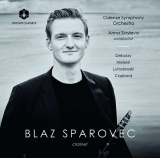Der slowenische Klarinettist Blaz Sparovec, Gewinner des Carl-Nielsen-Wettbewerbs 2019, beginnt sein Programm bei Orchid mit Debussys Première Rhapsodie, die er mit dem Dirigenten Vincenzo Milletari anfangs sehr mysteriös und spannend, danach virtuos und brillant gestaltet.
Auch in Nielsens Klarinettenkonzert zeigt sich der 27-jährige Slowene als perfekter Sachverwalter der Partitur. Zusammen mit der russischen Dirigentin Anna Skryleva gelingt ihm eine fein differenzierte, sehr vitale und kontrastreiche Interpretation, die die Modernität des Konzerts betont.
Lutoslawskis volkstümliche Tanzpräludien für Klarinette, Harfe, Klavier, Schlagzeug und Streichorchester werden mit feinem Gespür für das Nostalgische im Andantino und im Andante und für das Beschwingt-Tänzerische und Folkloristische in den schnellen Sätzen gestaltet.
Coplands teils lyrisches, teils virtuos verspieltes Klarinettenkonzert hat in Sparovec einen idealen Interpreten, der den Beginn wunderbar kantabel ‘singt’ und in der Kadenz virtuos beeindruckt. Der letzte Satz wird rhetorisch optimal aufgebaut, mit jazzigen und auch fein eleganteren Rhythmen, hier entspannt, dort kräftig akzentuiert, womit die rhythmische Vielfalt des Satzes mit genüsslichem Schmunzeln ausgekostet wird.
Slovenian clarinetist Blaz Sparovec, winner of the 2019 Carl Nielsen Competition, begins his program with Debussy’s First Rhapsody. With conductor Vincenzo Milletari his performance is at the beginning very mysterious and exciting, then virtuosic and brilliant.
In Nielsen’s Clarinet Concerto, too, the 27-year-old Slovenian shows himself to be a perfect interpreter. Together with the Russian conductor Anna Skryleva he succeeds in a finely differentiated interpretation, very vital and rich in contrast, which emphasizes the modernity of the concerto.
Lutoslawski’s Dance Preludes for clarinet, harp, piano, percussion and string orchestra are shaped with a fine sense for the nostalgic in the Andantino and Andante and for the lilting dance and folkloristic elements in the fast movements.
Copland’s partly lyrical, partly virtuosic clarinet concerto has an ideal interpreter in Sparovec, who ‘sings’ the opening wonderfully cantabile and impresses with virtuosity in the cadenza. The last movement is rhetorically optimally built up, with jazzy and also finely elegant rhythms, here relaxed, there powerfully accentuated, with which the rhythmic variety of the movement is savored with a pleasurable smirk.
























